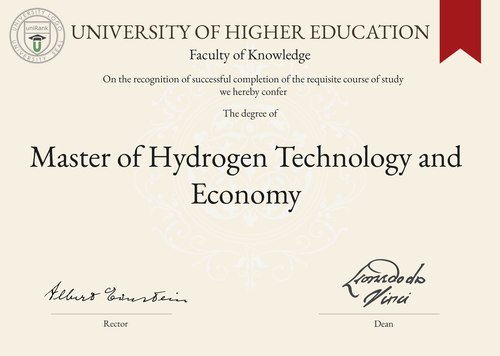
Master of Hydrogen Technology and Economy (MHT&E)
Guide to Master of Hydrogen Technology and Economy Program/Course/Degree
Master of Hydrogen Technology and Economy (MHT&E)

Program Name
Master of Hydrogen Technology and EconomyProgram or Degree abbreviation
MHT&EDuration range
The duration of the program can vary depending on the country or university, typically ranging from 1 to 2 years.Tuition range
Tuition fees for the program can vary depending on the country or university, typically ranging from $10,000 to $30,000 per year.Overview
The Master of Hydrogen Technology and Economy program is designed to provide students with a comprehensive understanding of hydrogen technology and its impact on the economy. Students will gain knowledge in areas such as hydrogen production, storage, transportation and utilization. The program aims to equip graduates with the skills and expertise needed to contribute to the development and implementation of hydrogen-based solutions in various industries.Curriculum Overview by year
Year 1: - Introduction to Hydrogen Technology - Hydrogen Production Methods - Hydrogen Storage and Transportation - Hydrogen Utilization in Energy Systems - Economics of Hydrogen Technology Year 2: - Advanced Topics in Hydrogen Technology - Hydrogen Safety and Regulations - Hydrogen Infrastructure Development - Research Project or InternshipKey Components
- Understanding of hydrogen production, storage, transportation and utilization - Knowledge of the economic aspects of hydrogen technology - Familiarity with safety regulations and infrastructure development - Practical experience through research projects or internshipsCareer Prospects
Graduates of the Master of Hydrogen Technology and Economy program can pursue various career paths in both public and private sectors. Potential job roles include: - Hydrogen Technology Consultant - Energy Analyst - Research Scientist - Project Manager in Renewable Energy Companies - Policy Advisor in Government AgenciesSalary Expectations
Salary expectations for graduates of the program can vary depending on factors such as location, industry and job role. On average, professionals in the field of hydrogen technology and economy can earn between $60,000 and $100,000 per year. For a more accurate understanding of salary expectations, you can utilize the Job Sites Search Engine, from our sister site jobRank, which searches over 4,600 job sites worldwide. Make sure to specify not only the job title but also the country you are interested in.Conclusions:
It is important to note that the duration, tuition fees, curriculum, key components, career prospects and salary expectations of the Master of Hydrogen Technology and Economy program can vary depending on the chosen country or location of study, as well as the chosen university. Prospective students are advised to research and compare different programs and universities to find the best fit for their individual goals and circumstances. Visitors interested in pursuing the Master of Hydrogen Technology and Economy degree can search for universities offering this program worldwide through the uniRank World Universities Search Engine. This tool provides a comprehensive database of universities and their respective programs, allowing individuals to explore options and make informed decisions about their education.World Universities Search Engine
search for Master of Hydrogen Technology and Economy (MHT&E) and add the Location (country, state etc.) or specific University you are interested in studying at.
Query examples:
- Master of Hydrogen Technology and Economy (MHT&E) United States
- Master of Hydrogen Technology and Economy (MHT&E) United Kingdom online
- Master of Hydrogen Technology and Economy (MHT&E) Australia international students
- Master of Hydrogen Technology and Economy (MHT&E) University of California
- Master of Hydrogen Technology and Economy (MHT&E) University of London tuition fees
- Master of Hydrogen Technology and Economy (MHT&E) University of Sydney scholarships
Share Program/Course
Interesting? Share this program/course/degree info with your friends now.